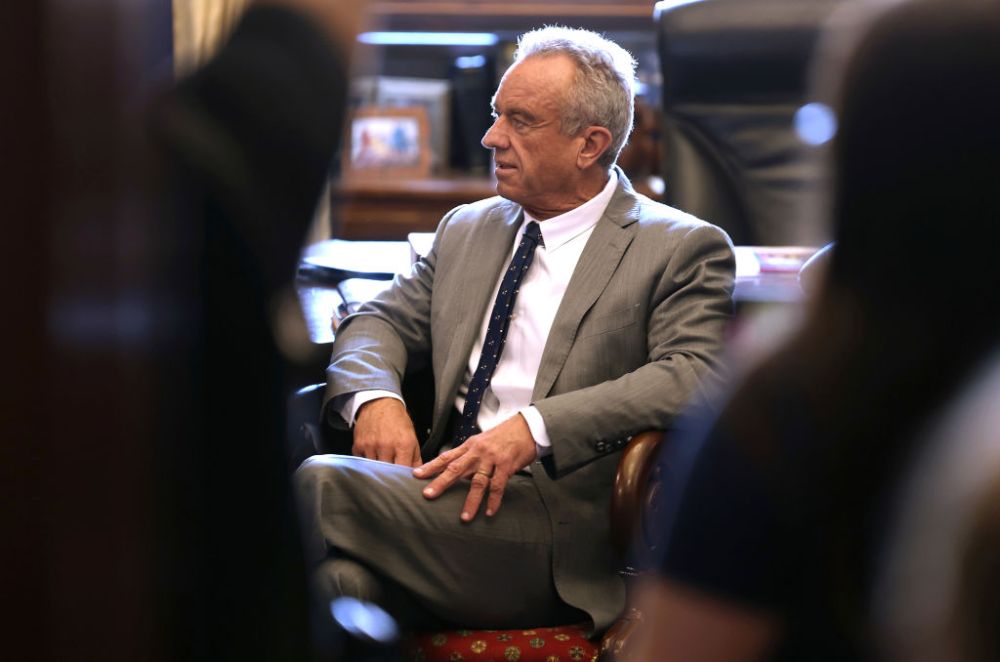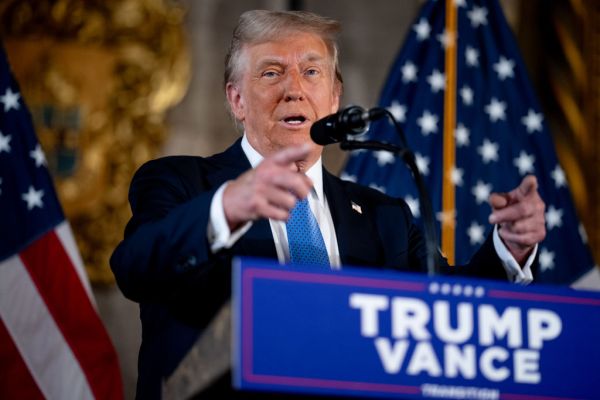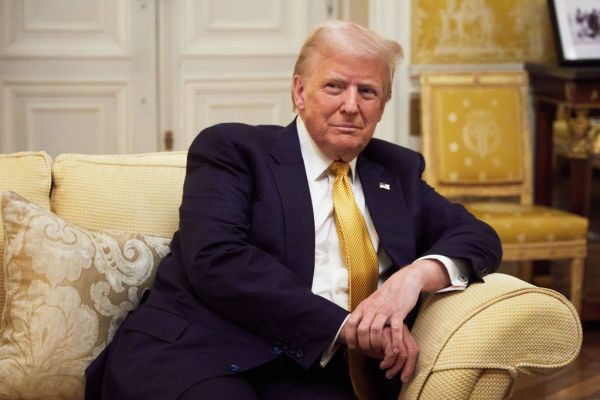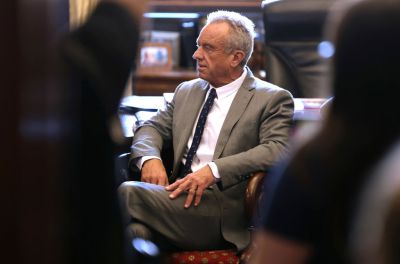I haven’t been following the Martian invasion of New Jersey closely (why is it always New Jersey?) but one report did catch my eye.
Since the panic over unidentified drones in the sky began, it turns out no less than 15 military aircraft stationed at a local base have been hit by lasers from the ground. In one case a pilot was injured seriously enough to require medical care after landing.
Donald Trump was asked about the drones this week and chose to feed the public’s anxiety, naturally. “The government knows what is happening,” he insisted darkly. “Something strange is going on and for some reason they don’t want to tell the people.” He’s been receiving intelligence briefings for more than a month yet didn’t appear to know what that “something strange” might be. In fact, he told reporters, because the drones had been spotted near Bedminster he’d decided to cancel an upcoming trip there.
All of this feels familiar.
A grassroots frenzy breaks out; expert naysayers are dismissed out of hand; Trump wades into it at some point to stoke suspicions; eventually someone gets hurt. It’s a populist parable for our times.
That was the story of the “Stop the Steal” saga that followed the 2020 election, which began with Fox News calling Arizona for Joe Biden on election night and ended with MAGA goons punching cops at the Capitol. It was also the story of “miracle cures” like hydroxychloroquine that caught on early in the COVID-19 pandemic. According to one study, some 17,000 people paid with their lives for that one.
The standard rebuttal to this sort of criticism is that the people can’t be faulted for being paranoid given how comprehensively the expert class has failed them. There’s a reason we now live in a low-trust society! And there’s truth to that. But trying to solve a problem of trustworthiness by electing Donald Trump president is like trying to cure COVID by injecting bleach. Not only will it not work, it’ll cause a bunch of new problems.
Let’s talk about one of those new problems, as the now-familiar populist parable is set to play out again. This time with the biggest body count yet.
Just asking questions.
Vaccine skepticism is a canary in the coalmine. If it’s gaining influence where you live, that’s a foolproof indicator that your culture is rotting and headed toward dark places. (In that sense it's like antisemitism.) The people are looking for witches and eventually they’ll find some to burn.
Do you realize how many vaccine skeptics there are around the incoming president right now?
Aaron Blake did a head count for the Washington Post. Some are well known, like the guy Trump wants to put in charge of America’s public health bureaucracy:
Less well known is former Rep. Greg Weldon, a medical doctor and Trump’s nominee to head the Centers for Disease Control. Weldon has “expressed support” for the COVID and flu vaccines, according to the Post, but during his time in Congress allegedly wouldn’t let go of the repeatedly debunked belief that vaccines cause autism. It was Robert F. Kennedy Jr. who proposed him to Trump for the CDC job, coincidentally.
Also coincidentally, one of the lawyers who’s assisting Kennedy in vetting candidates for public health positions has “petitioned the government to revoke its approval of the polio vaccine”—although the lawyer in question insists it’s not all polio vaccines he’s looking to ban. Just one polio vaccine.
Alongside the would-be health bureaucrats is an assortment of casual skeptics who are eager to ingratiate themselves to Trump’s tribe and seem to regard “just asking questions” about vaccines as an easy way to do so. Elon Musk, Pete Hegseth, Vivek Ramaswamy, Howard Lutnick, and Sean Duffy have each raised doubts in the past to some degree about the value of immunization, per Blake, usually involving the COVID vaccine but not always.
Earlier this year Kash Patel, the presumptive new face of federal law enforcement, went as far as to hawk capsules that promise to “detoxify” the body from the effects of mRNA vaccines. This must be the most thoroughly, and crankishly, anti-vax administration in the history of the United States.
Trump himself seems to be of two minds on the subject, caught between encouraging the paranoia of his base and protecting his own ego.
He’s proud of how quickly his administration brought the COVID shots to market and how many lives it saved. And he understands that deauthorizing the polio vaccine would put him on the wrong end of what’s likely to be a 20-80 issue. But he’s also seen firsthand how hostile his adoring fans can become when the subject of COVID immunization is brought up, to the point where he now avoids mentioning it. And he’s wondered for years about a possible link between vaccines and autism, don’t forget, even broaching the topic at a 2015 Republican primary debate.
What’s a conspiratorial populist who has to govern a country where anti-vaxxism is still a minority position to do?
Insinuation, not regulation.
I think he’ll do what he always does when we reach this stage of the populist parable. He’ll feed the paranoia.
A grassroots panic over vaccines has been spreading on the right since 2021. Expert opinion to the contrary has gotten nowhere despite remarkable statistical evidence that vaccination works. Now comes the point in the cycle where Trump wades in to goose the suspicions of his fans—which will probably gratify them enough that he won’t need to take any official action against vaccines in order to placate them.
Repeatedly in interviews lately he’s said that the question of whether vaccination causes autism requires further study and that RFK is just the man to do it. “I think vaccines are—certain vaccines—are incredible,” he told Meet the Press. “But maybe some aren’t. And if they aren’t, we have to find out.” I think it’s unlikely that he’ll risk a public firestorm by yanking anything off the market, just as it’s unlikely that Liz Cheney will do time in prison once Patel’s Keystone Kops target her.
But in both cases, simply launching an investigation can do grievous damage and achieve Trump’s political goals. He doesn’t need to see Cheney locked up to gain a measure of revenge on her. All he needs to do is impugn her by placing her under a legal cloud and invite the public once again to wonder whether his accusers, the self-anointed guardians of civic propriety, are the “real” criminals.
Ditto for vaccines. Hardcore anti-vaxxers might want to see the polio shot deauthorized, but most will be satisfied with seeing Trump and Kennedy use their perch to spread skepticism about whether vaccination works and, if it does, whether the side effects are worse than the disease. The two don’t need to regulate anything to reduce vaccine uptake among Americans. They need only insinuate—to “squeeze” the conventional wisdom that vaccines are a medical marvel.
And when they do, they’ll be sowing doubt in fertile soil. Three years of populism post-COVID have largely wrecked right-wing support for vaccination.
A Gallup poll published in August revealed one disastrous number after another. Just 26 percent of Republicans say it’s “extremely important” for children to be vaccinated versus 63 percent of Democrats. In 2001 the party shares were nearly identical. Republicans now oppose government vaccine mandates for children, 36-60, and nearly a third say vaccines are more dangerous than the diseases they’re designed to prevent. Just 12 percent said so in 2019. When asked whether vaccines cause autism, Democrats split 4-60. Republicans split 19-20, with 61 percent “unsure.”
Much of that 61 percent will end up forming an opinion over the next four years, I suspect. Care to wager on what it’ll be?
Cultural pressure.
This isn’t just polling claptrap, either. Growing vaccine skepticism is showing up in actual vaccination rates. In the 2019-20 school year, 45 states had at least 90 percent of kindergarteners immunized for measles, mumps, and rubella. In 2023-24, only 36 did. More than three-quarters fell short of 95 percent, the target rate in that age group to ensure herd immunity.
Here, too, Trump has been a pernicious influence. As a candidate he vowed to “not give one penny to any school that has a vaccine mandate or a mask mandate” if elected, his way of atoning to anti-vaxxers for having spearheaded the COVID shots in his first term. (His campaign claimed he was referring only to mandating the COVID vaccine but that’s far from clear.) Last year a survey found Republican support for mandating the MMR vaccine for schoolchildren declining from 79 percent in 2019 to just 57 percent in 2023. That will almost certainly drop further now that their hero appears to have condoned their skepticism.
It’s plausible that Republican states will spend the next four years rescinding their school immunization mandates, leading vaccine rates among children in Republican families to tank. Trump won’t need to deauthorize anything; once vaccination is a matter of choice and “freedom,” herd immunity be damned, cultural pressure on the right will provide the necessary barrier.
That’ll be when we reach the fourth stage of the populist parable, where people get hurt. It’s happening right now in Congo but there it’s a problem of vaccine supply. In populist America it’s a problem of demand egged on by the likes of Kennedy. Who, by the way, already has a considerable death toll to account for.
If you want to see what could plausibly happen to American opinion on vaccines, look at the data that Pew Research published earlier this month.
Pew’s survey wasn’t about vaccination, it was about “election integrity.” Each cycle, they’ve asked voters whether they thought that year’s election was administered well. Among Democrats there hasn’t been much variation: 94 percent said yes in 2020, 96 percent said so in 2022, and 84 percent said so this year in defeat. Among Republicans, however, it’s night and day. Just 21 percent agreed in 2020, then 53 percent in 2022, and 93 percent last month following Trump’s victory.
That’s 12 points of variability on the left and … 72 points of variability on the right courtesy of the “Stop the Steal” hysteria of four years ago. That’s how dramatically Republican opinion can shift when Trump is and isn’t egging on populist paranoia. Imagine how the numbers on vaccination might move with RFK as his mouthpiece on public health and other influential right-wing cranks in Congress emboldened to speak their piece about the supposed risks of inoculation.
A matter of trust.
If you find yourself wondering why Never Trump was so hysterical about seeing him return to the presidency, this is why. It’s not just a matter of Trump posing a threat to liberalism, although he does. It’s a matter of him empowering a populist zeitgeist so consumed with contrarian spite that it’s given to demonizing even phenomenal Enlightenment achievements like vaccines.
When you elect Trump, you don’t just get coup plots. You get his nominee to lead the FBI chirping about the “acumen” of QAnoners, his friend and close adviser on foreign policy wondering why anyone should hate Bashar al-Assad (here’s why, maybe), and his fans questioning whether their children should take advantage of possibly the greatest medical advance in human history. You get a cultural Dark Age.
A question for Trump apologists: What should we do to avert it, or at least mitigate the damage?
If they’re being honest they’ll say “nothing.” To be a populist is to be a victim and to be a victim is to lack agency, blameless for your own terrible choices. The elites have failed and so the people can’t be held responsible for not merely ignoring their advice but doing the opposite. If we end up with a measles outbreak next year because parents won’t vaccinate their kids, that’s not the parents’ fault. It’s Anthony Fauci’s fault for having misled them early in the pandemic about masks.
Let’s pretend, though, that the populist party just won total control of the federal government and now it, not the elites, gets to set policy. How should it go about restoring trust in our low-trust society such that Americans, particularly on the right, begin thinking about making vaccination great again?
It could try to restore faith in government by resolving to run the cleanest, most ethical administration America has ever seen, I suppose. But ethics aren’t Trump’s forte, you may have noticed; he’s more of a “fat envelope” kind of guy. And installing one of the country’s biggest cranks as head of Health and Human Services objectively isn’t an ideal way to boost public trust in government competence. That’s a political payoff to the Dark-Agers in the GOP base, not a confidence-building measure designed for the wider public.
The new government could focus on improving public education, I suppose, but here again self-aggrandizement is likely to be a higher priority than restoring civic trust. The point of postliberalism is to advance right-wing cultural priorities ruthlessly; it doesn’t aim to undo political indoctrination in schools so much as to coopt it for the right. A MAGA-inspired state curricula would accordingly be light on the scientific virtues of vaccines and political virtues of separation of powers, I think, and heavy on teaching alleged “controversies.” Some say that separation of powers is wise—but others say we need a strong, bold, all-powerful leader. Some say that vaccines are beneficial—but others say they’ll kill you stone dead.
A society in which kids aren’t sure what to think about stuff as basic as the Constitution, vaccination, and who “really” won the 2020 election seems unlikely to me to be higher-trust.
The new government could focus on trying to make the mainstream media do its job more accurately and responsibly. Certainly that project, if successful, would go a long way to rebuilding civic trust. But a president can’t do much to compel how the press behaves short of filing frivolous defamation lawsuits and trampling on its First Amendment rights. Even if he could, Trump’s idea of “fair” and “responsible” journalism is the right-wing media industry, a propaganda factory so shameless in its gatekeeping and embarrassing in its hero-worship that Kim Jong Un would blush at the sight of it. MAGA media’s “journalism” is less credible by any measure than that of the mainstream press, as the “Stop the Steal” fiasco demonstrated. Even its less ideological icons are known for not being, shall we say, sticklers about facts. Especially facts about vaccines, not coincidentally.
Many countries, North Korea among them, have a press whose only job is to convince its audience that the head of state can do no wrong. Do those countries tend to be healthy, thriving, “high-trust” societies in your experience?
Any serious response to America’s trust problem and the pathologies it’s created, like vaccine skepticism, begins with understanding that Trumpism isn’t a solution. It’s an accelerant. It’s treating social COVID with bleach. On November 5, Americans chose to inject themselves.








Please note that we at The Dispatch hold ourselves, our work, and our commenters to a higher standard than other places on the internet. We welcome comments that foster genuine debate or discussion—including comments critical of us or our work—but responses that include ad hominem attacks on fellow Dispatch members or are intended to stoke fear and anger may be moderated.
With your membership, you only have the ability to comment on The Morning Dispatch articles. Consider upgrading to join the conversation everywhere.